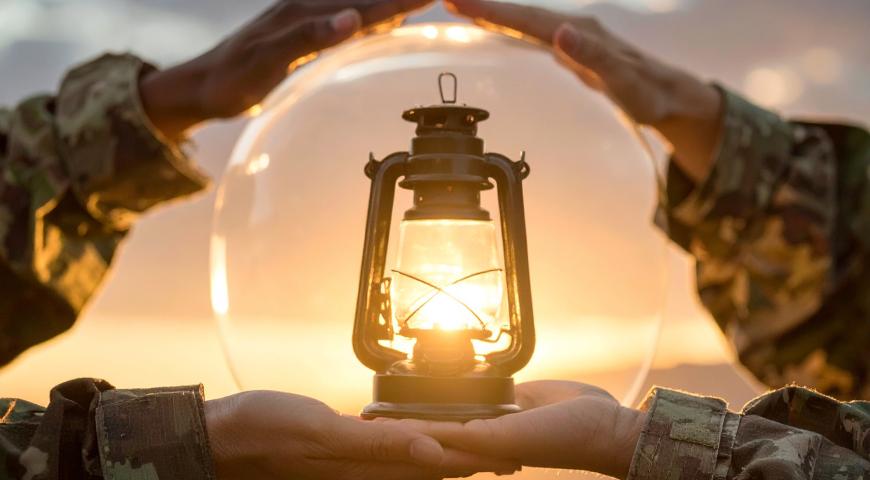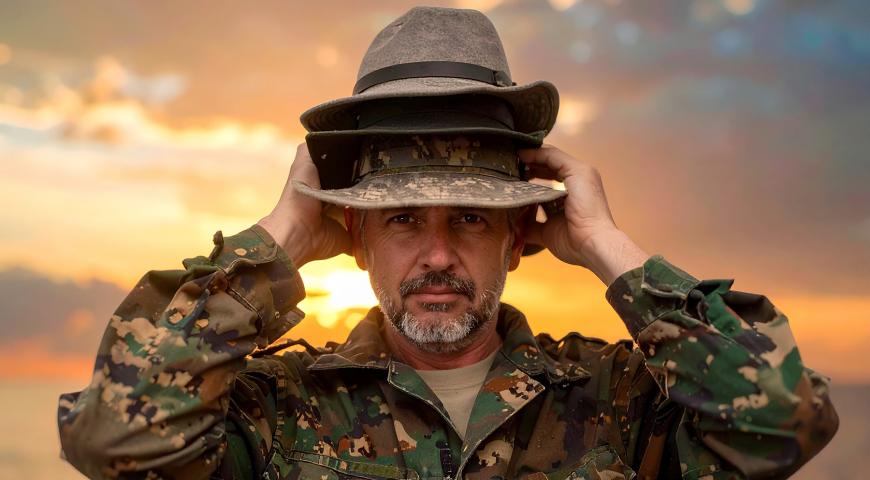“Too much has been said in praise of the calm demeanour as an asset to the fighting commander”
Brigadier General S. L. A. Marshall, 1948.
One of the most important success factors for any military organisation is the ability to identify and select effective leaders.[1] Although 'Great-Man-Theory' suggests that leaders are born with certain qualities or traits, over 70 years of research has failed to find 'traits' that would guarantee leadership success.[2] Yet, the research suggests there are some common themes consistencies that separate leaders from non-leaders. These themes include resilience, physical toughness, ability to motivate, and emotional intelligence. Of this list, emotional intelligence is the least discussed.
Introduction
The purpose of this article is to discuss the role that emotional intelligence can play as a leadership enabler for officers and recommend how it can be incorporated into the all corps officer training continuum. The article provides an overview of the current training curriculum and highlights the advantages of developing emotional intelligence from the ab-initio training level to application in real time situations.
Current training focus
Army officers need to be physically tough and mentally resilient. Officers should be able to lead from the front. This means an officer must be able to carry out daily operational tasks with enough energy in reserve to withstand the unexpected.[3] At the Royal Military College – Duntroon, the Australian Army’s ab-initio officer training facility, the trainees (known as staff cadets) are placed through arduous training designed to teach them how to operate under fatigue and stress. Such training helps these future officers deal with catastrophic events including death and suffering. As their careers progress, officers are required to conduct promotion courses. The curriculums of these courses emphasise building upon the skills, knowledge and attitudes taught during ab-initio training.
The curriculums of ongoing officer courses focus on reaffirming officer responsibility and planning skills. These courses help build an officer’s ability to lead at higher levels, and adjust to increasing responsibility. Furthermore, these courses build stronger planning and decision-making skills within officers. This training ensures that the capabilities of the officer corps is maintained. These courses highlight that officers have a responsibility to make decisions within a team environment. There is no set leadership style or gold plate solution optimal for decision making in team environments. However, an officer needs to be aware of, and able to mitigate, factors that can affect the implementation of decisions within teams. Yet, these career courses do not provide an adequate framework for this. Such a framework can be achieved through the development and application of emotional intelligence.
The importance of emotional intelligence
Emotional intelligence is focused on how emotion and intelligence are connected. This form of intelligence is characterised by the use and application of social skills to promote cohesion and build trust. Socially skilled individuals tend to be highly effective in leadership positions because they are able to persuade those around them. It is this persuasion that allows leaders to put emotional intelligence to use.[4] Success on the battlefield involves understanding people as a whole, not just the enemy. Furthermore, to understand individual behaviour is a vital element in learning to lead. Emotional intelligence helps leaders learn about individuals, including themselves. With this clear knowledge of individual strengths and weaknesses, leaders are more likely to work successfully with others and build a cohesive team.
There is a need to focus on the officer as the main leadership effort in the military context. As such, incorporating the concepts of emotional intelligence and group cohesion helps illustrate to military officers how individuals are influenced when within a group or larger unit.[5] The conundrum is how this can be effectively incorporated into the existing Army officer training continuum.
Decentralisation of leadership
As a response to the challenges of nonlinear and asymmetric operations, military organisations have decentralised responsibility and authority to team and leaders at lower levels.[6] This decentralisation, whereby the leader is not necessarily the highest ranked member, is exemplified by the dynamics of a Role 1 Treatment Team. Within this setting, a medic Sergeant may be required to issue orders or directions to their Platoon Commander on evacuation requirements or patient safety. This is where the professional standard of an officer can unfold. An officer with limited emotional intelligence may not realise they are required to not only give orders to their team – something their training has reaffirmed throughout their career – but also receive orders based on the situation. Another situation may be seen in an infantry or cavalry situations where an officer may have to take a subservient role to a junior due to battlefield position. Similar situations could be seen in training institutions, planning teams, and coalition environments. It is in these situations that individual judgement and emotional intelligence helps shape the officer’s response in knowing when to act and when to withhold certain types of behaviour.
Incorporation of emotional intelligence into Australian Army Training continuum
The nature of military service, regardless of the corps, is that soldiers may be called upon to serve in circumstances where peaceful resolution of conflict has failed. The value of education and training of emotional intelligence cannot be underestimated and should occur before one experiences the dynamic stresses of operations. Training assists in instilling the qualities and attributes that will allow the leader and their subordinates to adapt to their environment. This will enable them to consistently make the right decisions despite the pressures of fear, chaos and danger. However, teaching what some believe is an intrinsic part of character can be difficult.
This article argues that emotional intelligence should be a continuous theme throughout all military training. Emotional intelligence should not be treated like other stand-alone technical or tactical topics. Rather, emotional intelligence should be incorporated into the lessons and exercises of military practice. One major challenge is that teaching emotional intelligence is not as simple as a teaching a skill where practice leads to instinctive drills. Emotional intelligence is a trait that requires continuous development and a high level of self-awareness. This includes a person’s strengths and weakness, or areas to improve. Self-reporting can be a powerful tool to help achieve such self-awareness.
The use of self-reporting can assist in developing an officer’s self-awareness as they progress through their careers. Self-report methods are the most common way to measure those personal qualities that enhance emotional well-being and intelligence.[7] The Emotional Quotient Inventory, a peer reviewed self-report questionnaire, enables a member to identify their social and emotional strengths and weaknesses. The questions are worded in the form of short self-statements rated on a five-point Likert scale (1 being ‘not true of me’’ to 5 being ‘‘true of me’’). Self-awareness enables individuals to establish an overarching purpose for their lives that serve as an ongoing motivation for their purposes.2 Although emotional intelligence can be gained and improved at any point in life, Army should establish a start state during the ab-initio training. This enables officers to continue to track and develop their emotional intelligence capacity as they progress through their career. Such development helps grow officer leadership potential.
Development of emotional intelligence enhances, and even enables, the Army leader attributes and competencies listed within LWD 0-2 Leadership.[8] While LWD 0-2 Leadership has limited emphasis on, or links to, emotional intelligence, such intelligence is an integral part of what shapes and empowers an effective leader. Effective leadership is imperative to the achievement of military missions and the perception of individuals, regardless of tenure, as leaders. Because of this, emotional intelligence is paramount to leadership effectiveness.[9] The incorporation of emotional intelligence into doctrine, leadership courses, professional military education and even performance annual reports will contribute to increasing the capacity of our leaders. Such incorporation is likely to positively impact the organisation and the ability of Army to meet operational effectiveness.
Conclusion
There is no question that the Army officer training continuum is not taken seriously; it not only influences the officer’s performance as a leader but also directly impacts the overall success of our organisation and its operational effectiveness. However, any mistakes not learnt from and rectified during officer selection and training has the risk of being multiplied by the number of subordinates that an officer will lead. As highlighted in The Ryan Review Army training continuums should consider balance of command and influence for developing leaders and this includes exploration of alternative learning models for leadership development if necessary.[10]
This article has identified the advantages of including emotional intelligence in the all corps officer training continuum. It will enhance the skills and abilities currently taught, with an added focus on character development and decision making processes. Character, the core ingredient for leadership, resides at the centre of the Army's concept of command, leadership and management as an integrated system of action. The implicit need for decision making as an officer involves an emphasis on applying sound judgement and managing risk, whilst also empowering members under our command to understand and accept the rationale behind decisions being made.
Through the creation of a training program focused on an aggregate of emotional intelligence, abilities, competencies and skills, leaders will be better equipped to apply sound judgement, particularly in times of pressure or stress. As an Army in motion the merit in introducing emotional intelligence into the training continuum will positively impact the operational effectiveness and will be a driver of change in creating a more agile and adaptable force. The decision to incorporate emotional intelligence into the Army officer training continuum is one such example of the benefits of applying sound judgement to decision making.
Image credit: ID 153224632 © Roman Egorov | Dreamstime.com
[i] Carnes, A. (2015). What matters most in leader selection?: The role of personality and implicit leadership theories. Leadership & organization development journal, 36(4).
[ii] Lussier, R.N. & Achua, C.F. (2016). Leadership theory, application and skill development. Mason, Ohio South Western Cengage Learning, 6th Ed.
[iii] Department of Defence. (2020). RMC Training Program. Defence Jobs. Retrieved from https://army.defencejobs.gov.au/joining-and-training/officer-training-at-rmc/training-at-rmc
[iv] Goleman, D. (2006). Emotional intelligence. New York : Bantam Books.
[v] Siebold, G. L. (2007). The essence of military group cohesion. Armed Forces & Society, 33, 286-295.
[vi] Firing, K., Karlsdottir, R., & Laberg, J.C. (2009) Social influence in military leadership training. Leadership and Organization Development Journal, 3(8), 709-721.
[vii] Cherniss, C. (2010). Emotional intelligence: Toward clarification of a concept. Industrial and Organizational Psychology, 3, 110-126
[viii] Taylor-Clark, T. (2015). Emotional intelligence competencies and the Army leadership requirements model. U.S. Army Command and General Staff College.
[ix] Gibson, S. (2005) Perceptions of U.S. military leadership: are all leaders created equally? Equal Opportunities International, 24(2), 1-18.
[x] Ryan, M. (2016). The Ryan Review - A study of Army’s education, training and doctrine needs for the future. Retrieved from http://collab/army/aavntc/trgbr/Trg Dev Document Library/The Ryan Review - A study of Army's education training and doctrine needs for the future - April 2016.aspx
Social Mastery
Please let us know if you have discovered an issue with the content on this page.
Comments
Start the conversation by sharing your thoughts! Please login to comment. If you don't yet have an account registration is quick and easy.




